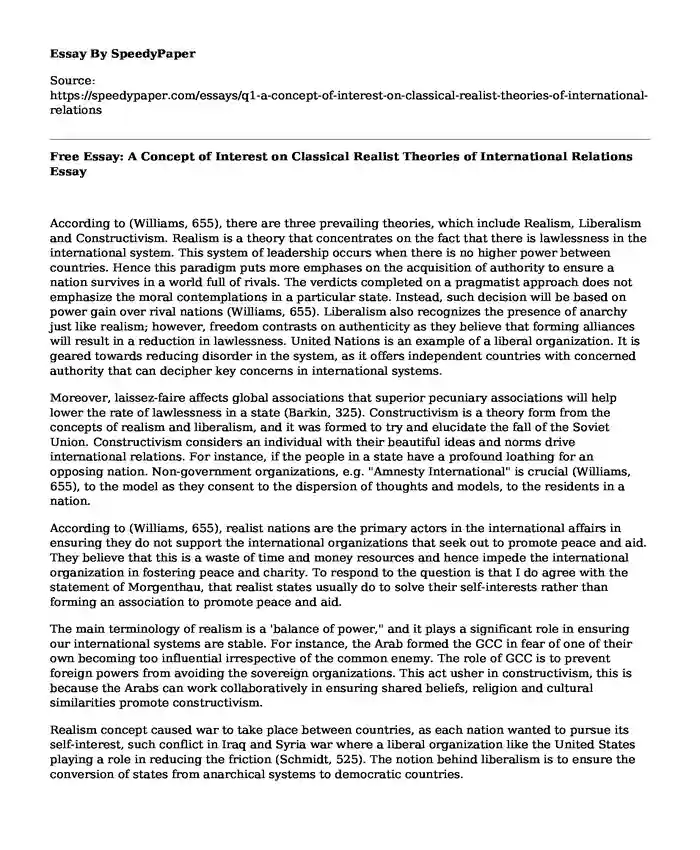
| Type of paper: | Essay |
| Categories: | International relations |
| Pages: | 3 |
| Wordcount: | 658 words |
According to (Williams, 655), there are three prevailing theories, which include Realism, Liberalism and Constructivism. Realism is a theory that concentrates on the fact that there is lawlessness in the international system. This system of leadership occurs when there is no higher power between countries. Hence this paradigm puts more emphases on the acquisition of authority to ensure a nation survives in a world full of rivals. The verdicts completed on a pragmatist approach does not emphasize the moral contemplations in a particular state. Instead, such decision will be based on power gain over rival nations (Williams, 655). Liberalism also recognizes the presence of anarchy just like realism; however, freedom contrasts on authenticity as they believe that forming alliances will result in a reduction in lawlessness. United Nations is an example of a liberal organization. It is geared towards reducing disorder in the system, as it offers independent countries with concerned authority that can decipher key concerns in international systems.
Moreover, laissez-faire affects global associations that superior pecuniary associations will help lower the rate of lawlessness in a state (Barkin, 325). Constructivism is a theory form from the concepts of realism and liberalism, and it was formed to try and elucidate the fall of the Soviet Union. Constructivism considers an individual with their beautiful ideas and norms drive international relations. For instance, if the people in a state have a profound loathing for an opposing nation. Non-government organizations, e.g. "Amnesty International" is crucial (Williams, 655), to the model as they consent to the dispersion of thoughts and models, to the residents in a nation.
According to (Williams, 655), realist nations are the primary actors in the international affairs in ensuring they do not support the international organizations that seek out to promote peace and aid. They believe that this is a waste of time and money resources and hence impede the international organization in fostering peace and charity. To respond to the question is that I do agree with the statement of Morgenthau, that realist states usually do to solve their self-interests rather than forming an association to promote peace and aid.
The main terminology of realism is a 'balance of power," and it plays a significant role in ensuring our international systems are stable. For instance, the Arab formed the GCC in fear of one of their own becoming too influential irrespective of the common enemy. The role of GCC is to prevent foreign powers from avoiding the sovereign organizations. This act usher in constructivism, this is because the Arabs can work collaboratively in ensuring shared beliefs, religion and cultural similarities promote constructivism.
Realism concept caused war to take place between countries, as each nation wanted to pursue its self-interest, such conflict in Iraq and Syria war where a liberal organization like the United States playing a role in reducing the friction (Schmidt, 525). The notion behind liberalism is to ensure the conversion of states from anarchical systems to democratic countries.
Conclusion
Realism is a theory that concentrates on the fact that there is lawlessness in the international system. This system of leadership occurs when there is no higher power between countries Liberalism also recognizes the presence of anarchy just like realism; however, liberalism contrasts on authenticity as they believe that forming alliances will result in a decrease of lawlessness. A candid example of liberal organizations is the United Nations. Constructivism is a theory form from the concepts of realism and liberalism, and it was formed to try and explicate the collapse of the "Soviet Union" (Williams, 655). "Constructivism" considers individual with their individual views and models that drive global associations. For instance, if the people in a state have a deep hatred for a differing government.
Work Cited
Williams, Michael C. "Why ideas matter in international relations: Hans Morgenthau, classical realism, and the moral construction of power politics." International Organization 58.4 (2004): 633-665.
Schmidt, Brian C. "Competing realist conceptions of power." Millennium 33.3 (2005): 523-549.
Barkin, J. Samuel. "Realist constructivism." International Studies Review 5.3 (2003): 325-342.
Cite this page
Free Essay: A Concept of Interest on Classical Realist Theories of International Relations. (2022, Nov 07). Retrieved from https://speedypaper.com/essays/q1-a-concept-of-interest-on-classical-realist-theories-of-international-relations
Request Removal
If you are the original author of this essay and no longer wish to have it published on the SpeedyPaper website, please click below to request its removal:
- Marketing Principles and Practice: TOMS Case Study Example
- Criminal Justice Essay Sample for Free Download
- Law Essay Example: Alternative Legal Venues
- Report for a Marketing Manager, Essay Example
- Red Sorghum (Hong Gao Liang) - Movie Analysis Essay Example
- Motivation in Organizations, Free Essay Example
- Essay example: Suggestion Based on the Service Quality Management
Popular categories




